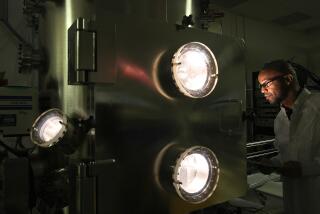Sematech Joins MCC Research Center in Calling Austin Its Home : Texas Capital Fast Becoming High-Tech Capital
- Share via
AUSTIN, Tex. — Texas’ capital city has the potential to be a world leader in microelectronics now that it has become home to a second national consortium doing research in the field, industry and university officials say.
The groups’ combined efforts--supported by University of Texas facilities and researchers--should help the United States compete better with Japan in microchip manufacturing.
Earlier this month, Austin was chosen to become the headquarters of Sematech, a research center formed by 13 companies involved in semiconductor manufacturing. The name stands for Semiconductor Manufacturing & Technology Institute.
The city already is home to Microelectronics & Computer Technology Corp., a consortium founded by 19 companies in 1983 to conduct research into advanced computer designs.
“Five years from today, there will be no finer microelectronics manufacturing capability anywhere in the world than in America,” predicts W. J. (Jerry) Sanders, chairman and chief executive Advanced Micro Devices Inc. His company is a partner in both Sematech and MCC.
Gov. Bill Clements said Sematech’s decision to locate in Austin “will make central Texas a world-class research region.”
Return to Premier Role
Bobby Inman, the former director of MCC, said a research and development coalition between MCC and Sematech should be at the forefront in the semiconductor field.
“That’s very important to all of us, because the drift had been in the other direction. The Japanese were steadily leading in this area,” Inman said.
“(When) you get the combined efforts of both of these organizations, and then how the companies use it that are funding it, we’ve got a real shot at getting the U.S. back in the premier role in semiconductors,” said Inman, who is now chairman of Westmark Systems Inc., a defense electronics holding company.
Austin was chosen over finalist cities in 11 other states as the site for Sematech.
Sematech officials say their group will develop advanced manufacturing technology for the 13 member companies, enabling the United States to compete in the global market and providing a domestic source of chips described as critical to America’s defense.
MCC, meanwhile, conducts a broader range of research in computers, including designing and packaging semiconductors, said Bill Stotesbery, MCC’s director of government and public affairs.
Semiconductors are vital ingredients in modern electronics systems, including computers, microwave ovens, communications satellites and military weapons.
“MCC is at the very earliest point and the very last point of the semiconductor development process,” Stotesbery said. “It directly complements the research being done by Sematech.”
The two research groups, which share seven corporate members, have been in close communication over the past several months, he said.
Hans Mark, former deputy director of the National Aeronautics and Space Administration and now chancellor of the University of Texas, predicts that Austin could become “the center of electronic manufacturing and electronic technology in the world” with the arrival of Sematech.
‘Critical Mass’ Growing
Sematech will help make the university attractive to leading scientists and engineers, and boost the school’s efforts to become a world leader in microelectronics, computer science and engineering, university President Bill Cunningham said.
Besides the two research groups, Austin also is home to facilities of a number of computer and semiconductor companies, including International Business Machines, Advanced Micro Devices, Motorola and Texas Instruments.
With the number of semiconductor companies in the city, and with the university in the process of expanding its Microelectronics Research Center, “you’ve got a real critical mass beginning to grow in this area,” Stotesbery said.
Added Inman: “Frankly, I think most of the things they (MCC and Sematech) will do together we don’t even envision yet. You’ll find that they’ll be out at the leading edge of what’s happening in this country.”
More to Read
Inside the business of entertainment
The Wide Shot brings you news, analysis and insights on everything from streaming wars to production — and what it all means for the future.
You may occasionally receive promotional content from the Los Angeles Times.










